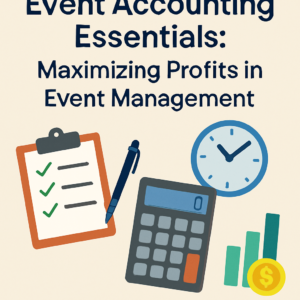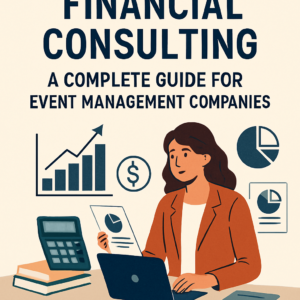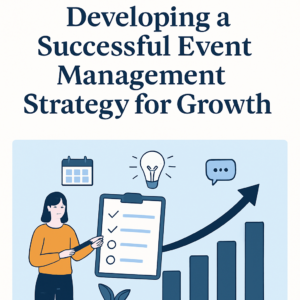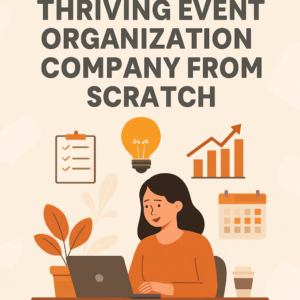Strategic Event Planning: Aligning Business Goals with Financial Success
In the world of corporate event management, aligning business goals with financial success is crucial for long-term sustainability. For event managers, this means crafting strategic event plans that not only meet client expectations but also drive profitability. In this blog post, we’ll dive into how you can harness strategy events to align your business objectives with financial outcomes, ensuring a win-win scenario for you and your clients.
Understanding the Power of Strategic Event Planning
Ever felt like you’re juggling flaming swords while riding a unicycle when organizing a corporate event? If so, you’re not alone. Strategic event planning is an art form—one that requires aligning your business goals with financial success. Let’s break it down and understand why it’s the secret sauce to thriving in the world of corporate event management.
Firstly, strategic event planning is more than just booking venues and sending invites. It’s about crafting experiences that resonate with your business objectives. According to the Event Trends Report 2023, 85% of businesses view events as critical to their success strategy. This means you’re not just throwing a party; you’re orchestrating a symphony that’s in tune with your company’s vision.
The Components of Effective Strategic Event Planning
- Clear Objectives: Define what you want to achieve. Whether it’s enhancing brand awareness or fostering team collaboration, having clear goals helps measure success later.
- Budget Alignment: A well-planned budget can mean the difference between an event that’s a hit and one that’s a miss. It’s all about getting the most bang for your buck without burning holes in your pockets.
- Stakeholder Engagement: Engaging key stakeholders early ensures their buy-in and support, which is crucial for seamless execution.
A well-thought-out strategic plan acts as a bridge between creativity and financial prudence. Imagine hosting an executive strategy meeting where innovation takes center stage, yet every cent spent aligns with broader business goals—a dream scenario for any corporate event manager.
If you’re wondering how this ties into financial strategy, think about the impact of aligning these elements with your company’s fiscal blueprint. With the guidance of a strategic CFO—like those featured in our article on The Role of a Strategic CFO in Driving Business Growth—your events can become powerful channels for driving business growth.
“Strategic event planning isn’t just about logistics—it’s about transforming company vision into tangible actions.” – Industry Insider Insight
The power of strategic event planning lies in its ability to translate visionary ideas into actionable plans that yield profitable results. So next time you find yourself planning an organizational strategy summit or marketing strategy event, remember: it’s not just another date on the calendar; it’s an opportunity to steer your company toward its goals with precision and flair!
Identifying Business Goals and Objectives
So, here we are, diving headfirst into the world of strategic event planning. Yes, it can feel like we’re trying to find where we left our favorite pen in a room full of pencils, but fear not! We’ve got some nifty tricks up our sleeves to help you align your business goals with financial success. First things first: let’s talk about identifying those business goals and objectives.
Strategic event planning begins with a crystal-clear understanding of your business goals. If you’re anything like most corporate event management moguls out there, you’re juggling multiple objectives—like boosting brand awareness or increasing client engagement—all while holding that cup of coffee that’s more lifeline than beverage.
Why Define Goals?
- To provide a roadmap for success
- To measure progress and achievements
- To enable better decision-making processes
If you’re thinking, “Okay, but how do I identify these goals?”—you’re asking the right questions! Start by having heart-to-heart conversations with stakeholders. Ask questions that get to the core of their vision. For example:
- What does success look like for this event?
- How does this align with our broader company strategy?
- What metrics will define our success?
Example:
A marketing strategy event planned to launch a new product might aim to generate a certain number of leads or increase brand visibility by X percentage over the next quarter. These specific, measurable objectives can pave the way for targeted planning and execution.
“Goals allow you to control the direction of change in your favor.” – Brian Tracy
Your mission, should you choose to accept it—and believe me, you should—is to ensure these goals are realistic, measurable, time-bound, and aligned with your financial strategy. This is where leveraging insights from financial experts can truly be game-changing. For instance, understanding The Role of a Strategic CFO in Driving Business Growth can shed light on aligning financial frameworks with your corporate strategies.
A well-defined set of goals doesn’t just illuminate the path forward; it acts as a safety net when unexpected challenges arise (because they will). Who hasn’t been thrown off course by an unforeseen hiccup? The key is having those solid targets to steer back towards.
In essence, aligning your business goals with strategic planning events isn’t just about checks on a list—it’s about creating meaningful connections between what you aspire to achieve and how you’ll make it happen. So grab that favorite pen once you find it (or maybe just buy another), and start jotting down those big ideas!
Integrating Financial Strategy into Event Planning
Alright, let’s talk turkey… or tofu, depending on your dietary preference. When it comes to integrating financial strategy into your event planning, things might feel like you’re trying to juggle flaming torches while riding a unicycle. But fear not! With the right approach, you can align your business goals with financial success without breaking a sweat (or dropping any flaming torches).
Why Financial Strategy Matters
You might wonder why incorporating financial strategy into your event planning is such a big deal. Well, consider this: a study by the PwC 2023 CEO Survey revealed that over 60% of CEOs are rethinking their budget strategies to ensure alignment with long-term objectives. That’s a hefty number of decision-makers who see the value in strategic financial planning!
“Planning is bringing the future into the present so that you can do something about it now.” — Alan Lakein
The Nuts and Bolts of Financial Integration
- Set Clear Objectives: Establish specific, measurable goals for your events that align with broader business objectives. Doing this not only keeps everyone on the same page but also helps in tracking progress effectively.
- Create a Budget Blueprint: Start with high-level numbers and break them down into detailed line items. Don’t forget to factor in hidden costs like taxes and insurance.
- Leverage Technology: Use financial management software to streamline processes and gain real-time insights. Software like QuickBooks or Xero can be lifesavers when it comes to maintaining accurate records.
- Regular Financial Meetings: Conduct sessions with your team to review finances regularly. [Understanding What is a Fractional CFO & Their Key Benefits](https://kommaswithkelle.com/what-is-a-fractional-cfo/) can also bring on board expertise without adding full-time costs.
- Contingency Planning: Always have a backup fund—a little cushion for unexpected surprises (because there will be surprises; this is event management after all!).
A Real-World Example: The Strategic Edge
A client of ours at Kommas with Kelle recently hosted a large-scale corporate strategy conference. By integrating their financial strategy early in the planning phase, they were able to keep expenses under control while enhancing attendee experience through innovative technology solutions and streamlined vendor partnerships. This led not only to staying within budget but also increased post-event engagement by over 30% compared to previous years.
If you’re feeling overwhelmed—or just curious about how digging deeper into these strategies could benefit your business—check out our piece on [Proven Business Growth Strategies for Small Businesses](https://kommaswithkelle.com/business-growth-strategies-for-small-businesses-a-guide-to-success/). It’s packed with insights tailored for event managers like you!
Remember, folks—integrating financial strategy isn’t just about saving money; it’s about setting your event up for long-term growth and success. Who knew finance could be this exciting?
Leveraging Technology for Enhanced Strategy Events
In today’s fast-paced business environment, technology is not just a convenient add-on; it’s the backbone of successful strategy events. From virtual reality to sophisticated data analytics, technology is reshaping how we plan and execute corporate events. After all, it’s not just about making things flashy—it’s about aligning with your business goals and achieving financial success.
The Role of Technology in Strategic Planning
- Virtual Reality (VR) and Augmented Reality (AR): These tools are revolutionizing event planning by creating immersive experiences that can simulate real-world scenarios. Imagine conducting a strategic management seminar where participants can walk through a digital twin of your company’s future office space!
- Data Analytics: Collecting and analyzing data before, during, and after an event allows you to fine-tune your strategies. Data-driven insights help in understanding attendee behavior, preferences, and feedback. According to a report by Statista, the global big data analytics market is projected to reach 4 billion by 2022, emphasizing its growing importance in strategic decision-making forums.
- Event Management Software: Streamline operations with platforms like Cvent or Eventbrite that handle registrations, scheduling, and feedback seamlessly. This software minimizes manual work and reduces errors—because let’s be honest, no one likes sorting through spreadsheets at midnight!
The Future is Digital: Embrace the Change
The move towards digital strategy conferences isn’t just a trend; it’s becoming the norm. By utilizing the right technologies, businesses can drive engagement and ensure their strategy events align with broader organizational goals.
“Technology will never replace great teachers, but technology in the hands of great teachers is transformational.” – George Couros
This quote couldn’t be more relevant for event planners today. As you integrate technology into your strategic planning events, remember it’s a tool to enhance—not replace—the human touch that lies at the heart of successful gatherings.
If you’re contemplating how these technological tools fit into your financial strategy for managing events effectively, you might want to read about the role of a Strategic CFO in driving business growth. They can offer insights into making financially sound decisions while leveraging technological advancements.
By embracing these technological innovations now, you’ll not only set yourself apart from competitors but also create memorable experiences that resonate with attendees long after they close their laptops.
Case Studies: Successful Alignment of Business Strategies and Events
Let’s dive into a few inspiring examples where corporate event planners rocked the boat by perfectly syncing business strategies with engaging events. These stories don’t just offer insights; they’re reminders that strategic alignment isn’t just possible—it’s powerful.
1. The Innovation Strategy Conference That Sparked Change
A leading tech firm realized they were trailing behind in innovation. Their solution? Hosting an Innovation Strategy Conference. By inviting key stakeholders and thought leaders, they facilitated discussions that led to real breakthroughs. The result was not just increased innovation but also a tangible uptick in market performance, proving the power of strategic events.
- Challenge: Lagging innovation impacting market share.
- Solution: Host an interactive conference to brainstorm with industry leaders.
- Outcome: New product ideas and a refreshed market strategy.
2. Leadership Strategy Sessions that Transformed Culture
An international retail company sought to overhaul its leadership style without disrupting operations. By organizing targeted Leadership Strategy Sessions, the company worked on aligning their management practices with their corporate values. According to a study by McKinsey, companies with effective leadership practices outperform others by over 20% in financial metrics.[1]
“Effective leadership isn’t just about being in charge; it’s about taking charge with empathy and strategy.”
- Challenge: Lack of alignment between leadership practices and corporate values.
- Solution: Curate sessions focused on strategic alignment and cultural transformation.
- Outcome: A harmonious work culture leading to enhanced employee satisfaction and retention rates.
3. Strategic Decision-Making Forums for Agile Growth
A mid-sized financial services company aimed to pivot towards more agile business strategies to enhance its growth trajectory. They organized Strategic Decision-Making Forums, bringing together cross-functional teams to brainstorm innovative ideas while ensuring strategic alignment with their goals. These forums not only bolstered agility but also strengthened inter-departmental collaboration.[2]
- Challenge: Needed a faster response to market changes.
- Solution: Foster decision-making forums focusing on agile strategies.
- Outcome: Accelerated decision-making processes and improved market adaptability.
Measuring Success: Metrics and KPIs for Strategic Events
Alright, let’s get down to the nitty-gritty of measuring success in strategic events. Whether you’re orchestrating a grand business strategy workshop or a sleek executive strategy meeting, knowing which metrics and KPIs (Key Performance Indicators) to track is crucial. Because let’s face it, you wouldn’t want to throw your resources into an event without knowing if it’s hitting the mark or missing it entirely.
The Basics of Event Metrics
First things first, the basics. Metrics are the backbone of understanding how well your event aligns with business goals. Here’s a simple breakdown of key performance indicators that should be on your radar:
- Attendance Rate: The number of registered attendees versus actual attendees can tell you a lot about interest and engagement levels.
- Participant Engagement: Activities like polls, Q&As, and breakout sessions can measure how engaged your audience is during the event.
- Satisfaction Scores: Post-event surveys are golden for gauging attendees’ satisfaction and identifying areas for improvement.
- Return on Investment (ROI): Compare the revenue generated from leads and partnerships formed against the cost of the event itself.
Diving Deeper: Advanced Analytics
Moving beyond basic metrics, think about integrating more advanced analytics into your strategy events:
- NPS (Net Promoter Score): This measures attendee willingness to recommend your event to others—an indicator of overall satisfaction and loyalty.
- Lead Conversion Rates: Track how many of those who attended turn into clients or partners post-event.
- Social Media Mentions & Engagements: A buzz on social media signals broader outreach and brand engagement. Who doesn’t love a bit of viral fame?
The aim here is not just to collect data but to translate it into insights that propel future events onto bigger platforms with even greater precision. As they say in finance (and at Kommas with Kelle), “If you can’t measure it, you can’t improve it.” And honestly, who doesn’t want their next corporate strategy conference to be even more smashing than the last?
“Measurement is the first step that leads to control and eventually to improvement.” – H. James Harrington
If you’re curious about how effective strategic financial planning plays into all this data-driven decision-making, check out our guide on “Benefits of a Strategic Accountable Plan for Business“. It’s packed with tips on using metrics effectively in aligning financial strategies with business goals.
Aligning business goals with financial success through strategic event planning is more than just a trend—it’s a necessity in today’s competitive corporate landscape. By understanding the synergy between effective planning and sound financial practices, you can create impactful events that drive growth for both you and your clients. Start implementing these strategies today to see tangible results in your next corporate gathering!









